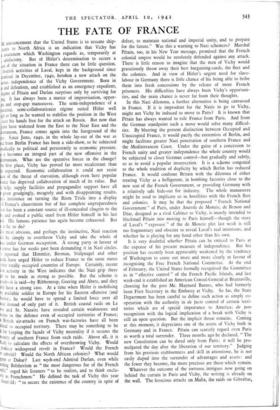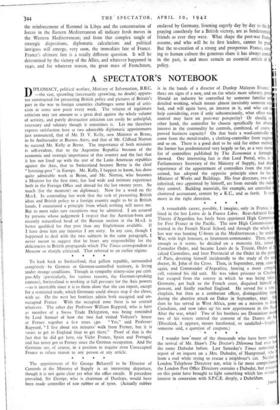THE FATE OF FRANCE
announcement that the United States is to resume ship- eats to North Africa is an indication that Vichy has assurances which Washington regards as, temporarily at satisfactory. But of Hitler's determination to secure a n of the situation in France there can be little question. feverish activities of Laval, kept in the background since .ssal in December, 1940, betoken a new attack on the ous independence of the Vichy Government. Born in and defeatism, and established as an emergency expedient, une of Petain and DarIan surprises only by surviving for It has always been a matter of improvisation, oppor- and stop-gap manoeuvre. The semi-independence of a utrai, semi-collaborationist regime suited Hitler well h so long as he wanted to stabilise the position in the West leave his hands free for the attack on Russia. But now that tans have widened from the East to the Near East and the erranean, France comes again into the foreground of the . Since June, 1940, in the whole lay-out of the war as from Berlin France has been a side-show, to be subjected alically to political and persistently to economic pressure. it becomes an integral part of the new offensive in the erranean. What are the operative forces in the change? first place, Vichy has proved far more recalcitrant than r expected. Economic collaboration it could not resist se of the threat of starvation, although even here popular lance has deprived collaboration of much of its value. But help, supply facilities and propagandist support have all given grudgingly, meagrely. and with disappointing results. vs insistence on turning the Riom Trials into a display of France's chauvinism but of her complete unpreparedness war has been a constant source of ill-concealed chagrin to the s. and evoked a public snarl from Hitler himself in his last b. His famous patience has again become exhausted. But is he to do?
most obvious, and perhaps the instinctive, Nazi reaction Id be simply to overthrow Vichy and take the whole of under German occupation. A strong party in favour of I course has for weeks past been demanding it in Nazi circles. is reported that Himmler, Borman, StUlpnagel and other lerals have urged Hider to reduce France to the same status other totally occupied countries of Europe. Certainly, recent ush activity in the West indicates that the Nazi grip there On to be made as strong as possible. But the scheme is wused—it is said—by Ribbentrop, Goering and Abetz, and they illy have a strong case. At a time when Hitler is mobilising ry available soldier in Europe for his Eastern offensive (and ensive), he would have to spread a limited force over all Ace instead of only part of it. British coastal raids on Le IR. and St. Nazaire have revealed certain weaknesses and lutes in the defence even of occupied territories of France; I British air-attacks on French war-factories have all been bed to occupied territory. There may be something to be I for keeping the façade of Vichy neutrality if it secures the nunity of southern France from such raids. ' Above all, it is 'cult to calculate the effects of overthrowing Vichy. Would Produce widespread revolt in France? Would the French submit? Would the North African colonies? What would pen at Dakar? Last w.eek-end Admiral Darlan, even while tiding Bolshevism as "the most dangerous foe of the French urged his listeners "to be realists, and to think exclu- 1Y as Frenchmen." He defined the task of Vichy this year fireef old: "to secure the existence of the country in spite of defeat, to maintain national and imperial unity, and to prepare for the future." Was this a warning to Nazi schemers? Marshal Petain, too, in his New Year message, promised that the French colonial empire would be resolutely defended against any attack. There is little reason to imagine that the men of Vichy would gratuitously throw away their best bargaining-cards, the fleet and the colonies. And in view of Hitler's urgent need for slave- labour in Germany there is little chance of his being able to bribe them into fresh concessions by the release of more French prisoners. His difficulties have always been Vichy's opportuni- ties, and the main chance is never far from their thoughts.
In this Nazi dilemma, a further alternative is being canvassed in France. If it is imprudent for the Nazis to go to Vichy, might not Vichy be induced to move to Paris? It is known that Petain has always wanted to rule France from Paris. And from the German standpoint such a move would solve many difficul- ties. By blurring the present distinction between Occupied and Unoccupied France, it would pacify the extremists of Berlin, and might facilitate greater Nazi penetration of southern France and the Mediterranean Coast. Under the guise of a concession to French unity and greater independence the whole country would be subjected to closer German control—but gradually and subtly, so as to avoid a popular insurrection. It is a scheme congenial to the whole tradition of duplicity by which Berlin has reduced France. It would confront Britain with the dilemma of either treating Vichy as a belligerent, in bombing factories close to the new seat of the French Government, or providing Germany with a relatively safe hide-out for industry. The whole manoeuvre might be used to implicate us in hostilities with the French fleet and colonies. It may be that the proposed "French National Government" of Paris, under Anatole de Monzie, de Brawn and Deat, designed as a rival Cabinet to Vichy, is merely intended to blackmail Petain into moving to Paris himself—though the story of Laval's " exposure " of the de Monzic plot last week is still too fragmentary and obscure to reveal Laval's real intentions, and whether he is playing for any hand other than his own.
It is very doubtful whether Petain can be enticed to Paris at the expense of his present measure of independence. But his position has recently been appreciably weakened by the tendency of Washington to come out more and more clearly in favour of recognising the Free French National Committee. At the end of February, the United States formally recognised the Committee as in "effective control" of the French Pacific Islands, and last week-end it established an American Consul-General at Brazzaville, choosing for the post Mr. Maynard Barnes, who had formerly been First Secretary in the Embassy at Vichy. So far, the State Department has been careful to define such action as simply co- operation with the authority in de facto control of certain terri- tories which are of special importance to America; de jure recognition with the logical implication of a break with Vichy is still an open question. But the implicit threat remains. Coming at this moment, it depreciates one of the assets of Vichy both in Germany and in France. Petain can scarcely regard even Paris as worth a total surrender. Three months ago he declared, "The new Constitution can be dated only from Paris: it will be pro- mulgated the day after the liberation of our territory." Judging from his previous stubbornness and skill in attentisme, he is not easily duped into the surrender of advantages and assets: and the fewer they become, the more precious are those which remain.
Whatever the outcome of the tortuous intrigues now going on behind the curtain in Paris and Vichy, the writing is already on the wall. The ferocious attacks on Malta, the raids on Gibraltar, the reinforcement of Rommel in Libya and the concentration of forces in the Eastern Mediterranean all indicate fresh moves in the Western Mediterranean; and from that Complex tangle of strategic dispositions, diplomatic calculations and political intrigues will emerge, very soon, the immediate fate of France. France's ultimate fate is a totally different question. It will be . determined by the victory of the Allies, and whatever happened in 1940, and for whatever reason, the great mass of Frenchmen, enslaved by Germany, listening eagerly day by day to the B praying ceaselessly for a British victory, are as fundamen friends as ever they were. What shape the post-war Franc assume, and who will be its first leaders, cannot be pr But the re-creation of a strong and prosperous France, con ing to human culture the generous share it has always conm in the past, is and must remain an essential article of policy.



























 Previous page
Previous page